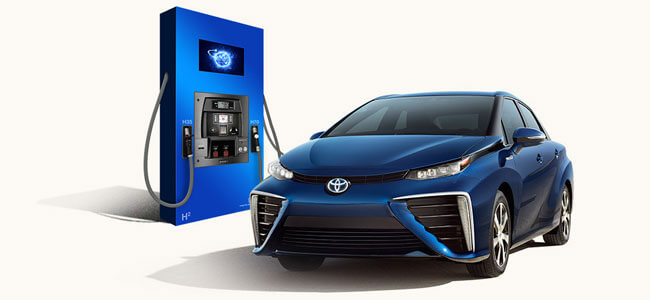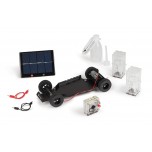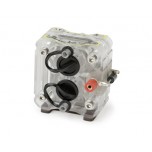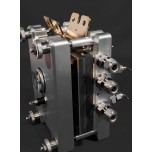 Hydrogen fuel cells have become increasingly well known. If you haven’t heard of them, you might be a bit behind. But does it even matter if you do get left behind?
Hydrogen fuel cells have become increasingly well known. If you haven’t heard of them, you might be a bit behind. But does it even matter if you do get left behind?Many automotive manufacturers have chosen fuel cell technology as the long-term solution to replace combustion engines when the oil stops flowing -- but that’s not expected to happen for at least another 15 years (even if we keep using it at our current rate). So why are we bothering to get so excited about hydrogen fuel cells now?
Even if you know nothing about fuel cells -- you’ve never even heard of them, and you’re totally uninterested, so what?
You’ll still be able to go to the gas station tomorrow and fill up your car. In fact, you will be able to do this for at least another 15 years -- and let’s face it, that’s more than enough time for anyone to fill up their car.
So just what is so great about fuel cells, and why do we need them now?
Well, in developed countries, the average life expectancy is a few years lower in urban areas than in rural areas, and this is in part due to the toxic fumes that we breathe in when we walk around cities. These fumes come from vehicles.
Hydrogen fuel cells provide the possibility of living in a world where the only thing leaving vehicles is water vapor. Imagine taking a drink out your exhaust pipe. It sounds crazy, but it’s becoming a reality, as the only thing coming out the exhaust of a hydrogen car is water vapor, not the endless list of toxic fumes that get blasted the exhaust of every engine.
Cities will clean up, acid rain will be reduced, and it will help to reduce global warming. In fact, approximately 35% of all greenhouse gas emissions would be completely taken away if the world were to use hydrogen fuel cells. So, by using hydrogen, you will be helping the environment; however, how does hydrogen help you?
We’d all like to help save the planet, but at the end of the day, if it’s not benefitting us directly, most of us want to put our money where our mouth is, so how does hydrogen help the average consumer?
To start with, hydrogen gets you many more miles per volumetric energy input. A standard internal combustion engine is incredibly inefficient, and most of the fuel you spend your hard-earned cash on is wasted.
And if you don’t believe me -- just think about it -- you want all your fuel to be converted into kinetic energy (driving the car forward) -- so what creates all that noise and heat? That’s wasted energy. Then you also consider the amount of unburnt fuel which goes out the exhaust pipe, and the force needed to push gases through the catalytic converter (up to 10% of engine power) – then you realize just how little of your gas is actually driving your car.
A hydrogen fuel cell on the other hand doesn’t have these problems. They do produce noise and heat, but a smaller quantity since there are far fewer moving parts. They also do not have an exhaust system to force gases through. By comparison, an average engine running on petroleum with give you about 0.25 km per MJ (mega joule) of energy, while a fuel cell will give you 0.4 km per MJ.
But there is also another benefit to having fewer moving parts. Fuel cell cars break down less, since there are fewer parts to break. This means lower maintenance bills, and less time spent sitting at the side of the road (which has got to be the biggest dread of any driver). In fact, they are not just more reliable than normal vehicles; they have close to 100% reliability proven in many tests.
So, before you rush out to your nearest showroom in a flurry of excitement and slap your credit card down to get a hydrogen powered car -- you ought to know the downsides. The cars themselves are vastly expensive, you’re looking at upwards of $100,000 for a standard family car, and a kilo of hydrogen will cost you about $20; by comparison this is like paying $25 for a gallon of gas, and governments haven’t even began taxing it yet. Oh, and you might be driving for quite a while to get to the nearest hydrogen filling station.
However, when the first motor cars were built and sold, the world did not have many filling stations, and only the richest people could afford them. But it wasn’t long before the price started dropping -- and cars became a fully integrated part of society. Hydrogen cars will also become that way soon -- and they may end up being comparably cheaper than the cars we drive now, as well as having all the other added benefits.
Once the technology is available to the masses, prices will fall, and further research will allow the materials to be produced more efficiently, or even substituted for other components. The most expensive part of a fuel cell is the platinum plate that allows the chemical processes to take place within the cell -- if an alternative to platinum could be found, the fuel cell stack cost would be greatly reduced.
The other complaint that many people have with hydrogen is that it is flammable. They point to events such as the Hindenburg disaster as evidence. But so is oil -- you wouldn’t stick a lit match in your fuel tank, and the flames with petrol last for much longer. While hydrogen is slightly more volatile, the force is quickly dissipated, and therefore, if it is properly stored -- the flammability argument is almost pointless.
Overall, hydrogen is a far better option than the internal combustion engines we use now, we just need to wait for it to become mainstream, like the original motor cars did over 100 years ago. When that time comes, I am positive that we will never want to look back!

 Posted by
Posted by
















